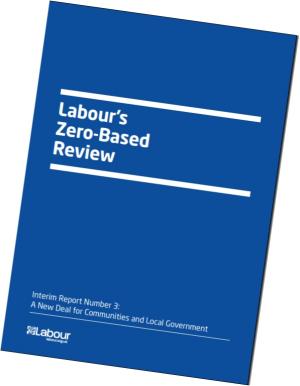



It's no surprise, but the Labour Party has now stated officially that it will abandon the New Homes Bonus if it gets elected at the 2015 general election.
The decision was announced as part of its "Zero-Based Review" which is systematically reviewing where government can save money in order to avoid any increase in public borrowing to fund day-to-day expenditure (hence the "zero"). The latest review (Interim Review No. 3: A New Deal for Communities and Local Government") examines the opportunities to adjust the spending of DCLG.
The key statement about NHB in this latest report reads:
Labour will also end the complex, regressive and ineffective ‘New Homes Bonus’ with the funding reallocated more fairly within local government. The National Audit Office has found no persuasive evidence that the New Homes Bonus is having the effect of incentivising new house building and the Public Accounts Committee has questioned its effectiveness and fairness of its distribution, calling for an urgent review. (p.7).
What next?
The Interim Reports are not the final word: their outputs will eventually be drawn together to inform Labour's manifesto, along with the Spending Review Labour would undertake should it achieve power. But is is unlikely that there will be a u-turn on the abolition of the New Homes Bonus. The recent DCLG evaluation of the measure (an EHN review of which will be forthcoming shortly) does not add any credible evidence to suggest that the NHB is effective as far as incentivising new house building goes--whatever its merits in regard to empty homes work-- and there is a long record of criticism of NHB by senior Labour figures.
For EHN the challenge will be to offer alternatives to NHB in the event that it is abolished. The latest draft of our policy position paper does that by resurrecting an idea we proposed back in 2008 in response to the consultation on Housing and Planning Delivery Grant, namely that the government offer revenue match funding for empty homes officers. As we point out in the draft policy paper, our proposal can be costed at £8million per annum, compared with the current £114million per annum being doled out as New Homes Bonus as a reward for bringing empty homes back into use, little of which is seen by empty homes teams. Our match-funding proposal would on any reasonable view represent a much more effective use of money. The main drawback of our proposal is not inherent to the proposal itself: it is that it cannot address the lack of political will in central government to actually do the kind of governing which ring-fenced, agenda-oriented funding implies.
Empty Homes in the Interim Review
It may be thought disappointing that the Interim Review does not mention empty homes in its brief section on housing (from which the paragraph quoted above is drawn) nor the fact that research does suggest that, if nothing else, New Homes Bonus incentivises local authorities to tackle empty homes. But quite simply, the document seems not to be intended to address that level of detail. Most of the specifics around front-line services and delivery are examples and case studies designed to highlight supposed failures of the current goverment or the best practice of Labour-controlled local authorities.
Interim Review Proposals
The main proposals within the Interim Review are not about delivery but about organisation and structure, with the emphasis on measures to produce efficiency savings through sub-regional organisations and shared services. Amongst other things, the Review mentions
- more shire unitaries (like Cornwall, Shropshire, Northumberland)
- "virtual shire unitaries" (separate districts sharing common services across a shire)
- transferring £30billion of funding over five years to city and county regions
- "an English Devolution Act pushing power out of Whitehall to Combined Authorities with coterminous LEPs, across areas including transport and housing, business support, skills and employment support"
